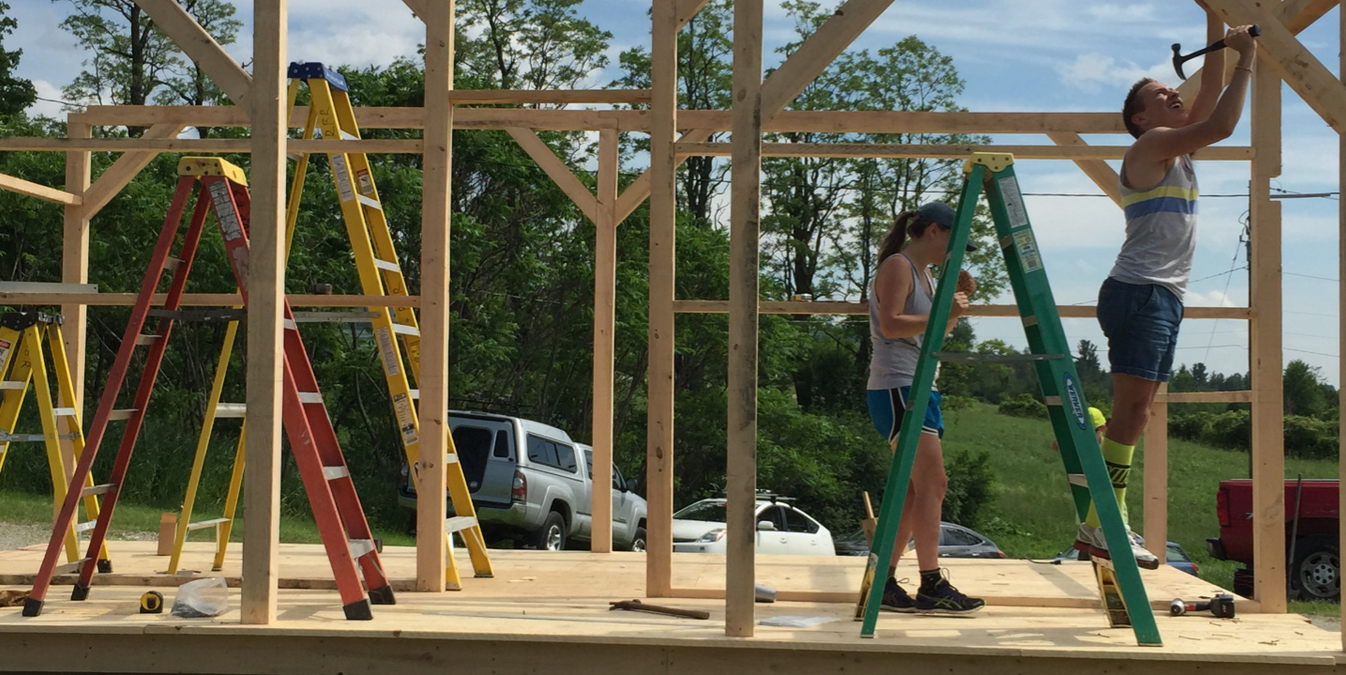This piece is cross-posted from Climate Journey, a storytelling expedition from New England to Paris by SustainUS COP21 delegates Morgan Curtis and Garrett Blad. They are writing, photographing, filming, collaging and painting, telling stories of individuals and communities mobilizing for a just transition to a climate-stable future.
“Five years ago? I knew not a soul here.” Nate Palmer’s wiry beard lifted with a smile. Fire, people, sparks, danced in his eyes. “Just Jane.”
Jane Palmer was leant up on the rough hewn back deck of their Vermont farmhouse, watching the merriment below, her marigold cap pulled over her flyaway hair.
“It’s funny how the first step of fighting something is loving one another,” I remarked, looking Nate in the eye.
“Quite true, that is. These are good, hard-working people that have come into our lives.” The sun had dropped behind Raven Ridge, work had finished for the day, and the Brass Balagan Band was filling the night air with joyful rhythm and trumpetry.When you pedal onto Nate and Jane’s land you pass four signs. Large blue letters welcome you to LAUGHING TREE FARM. Another is bright, handpainted, and declares NO FRACKING GAS PIPELINE HERE with two downwards pointing arrows. Tacked to it is a smaller placard reminding you to PUT PEOPLE FIRST. Handwritten white paint on the weathered fence embodies PEACE ON EARTH.
There is such a thing as the language of sweat, the silent conversation of working hard. It’s an intentional aversion to comfort, a commitment to the pain of a life fully lived. Shirts come off, splinters dig in, screw guns drop onto toes, skin burns in the June sun. Laughter is the great communicator, the sign that a day’s work is not yet done.
Such rose a cottage that day, mismatched timber frame piece by piece. John, Steve, Peggy, Christian, Beth, George, Nate, Jacob, Morgan, Garrett. Neighbor, carpenter, Mohawk, future-restaurant-owner, cancer survivor, retired minister, mechanic, fifth grader, meandering cyclists. Between the hammering, ladder climbing, and rehydrating came the stories.
What brings you here? Why do you do what you do? What keeps you going? Faith, and a life modeled after Jesus. Ancestry, and its commitment to protection of Mother Earth. Death, and the realization that life is worth living before it. Love, of family, community and land. Fireflies, wetlands, beech trees and April mud.
“On that’s the easy part,” Nate chuckled when I asked how the cottage would be moved into place. “Drag it with the tractor, up on some rollers, down the hill over there. I’ve always been moving houses. That’s how I got hooked up with Jane here. She asked me to move her house across the valley. That was thirty years ago.”
We looked out from our little construction site, hands shading our eyes from the overhead sun. Open fields roll out and away from the house, down to the pond next to which the cottage will go. It’s been raining for weeks, and the saturated earth is just beginning to breathe again. This is where they mapped the pipeline to go. Coming in from Colchester, right on through the cottage spot, up and over the hill, eventually to Middlebury. Maybe.
“When the gas company comes to your house, they tell you not to talk to your neighbors,” Beth told us. “They forget that this is Vermont. We jump on the phone straight away and say “Betsy, did they come to yours yet? Yee gawd, how are we going to stop this?”” First step, of course, was a party, or two. Everyone gathered, thirty to a living room, each and every Friday night, and began to expand their definition of family.
Guinea hens screamed as they flapped to and from the eaves of a collapsed barn. Christian joked it would make quite the sizable bonfire, and someone else warned that we’d have to move the three hybrid cars parked close by.
“We moved here for cheap, five rundown buildings, all ours now. We wonder why we took them on sometimes,” Nate gestured out, “but it’s beautiful land. Has to be fate, or something, that put us here to protect it all.” I believe in such things, and felt his earnest resilience. “We’ll move into the cottage, just for a little, while we fix up the house.”
Nate and Jane have been to the Public Service Board hearings in Montpelier, the state’s capitol, making their voices heard in the corridors of control. This cottage is a different form of resistance, its construction a family reunion of sorts. I asked Nate what it is they grow here on the corner of Rotax Road.
“Corn, some, but we farm farmers, mostly. We free lease our land to anyone trying to learn what it takes to making a living off of it.” He looked out at the dancers, the free spirits, the trombone-players and blockaders. “And, of course, our land has been growing quite a few activists lately.”


